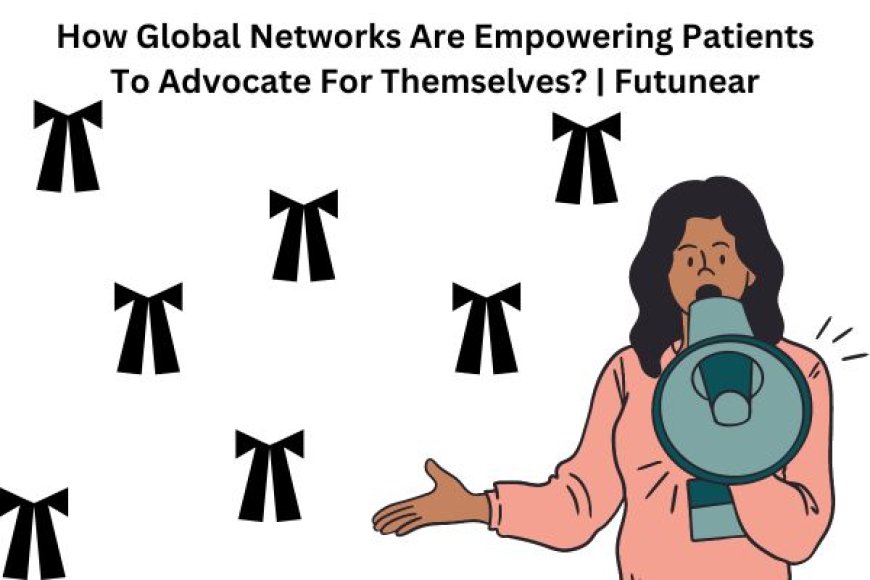How Global Networks Are Empowering Patients To Advocate For Themselves? | Futunear
Learn how online communities, innovative healthcare solutions, and advocacy groups break down barriers to create a more patient-centered healthcare system.

The traditional doctor-patient relationship has historically positioned healthcare professionals as the primary decision-makers. However, a paradigm shift is underway within the global health community. Patients are exponentially taking a more active role in their healthcare journey, empowered by the rise of global networks, like the Health FutuNear Society, and access to information. This trend toward patient advocacy is transforming the healthcare landscape, leading to a more collaborative and patient-centered approach to care.
This blog entails approaches that use global networks to empower patients to advocate for themselves.
How Do Online Resources Empower Patients?
This growing emphasis on patient empowerment is fueled by several factors. The internet has democratized access to healthcare information, enabling patients to research their conditions, understand treatment options, and ask informed questions. Online patient communities create a space for individuals to get in touch with others facing similar health challenges, promoting a sense of support and shared experiences. Additionally, the rise of social media platforms allows patients to amplify their voices, advocating for improved healthcare access, treatment options, and research efforts.
Global networks play a critical role in empowering patients to advocate for themselves. Online patient advocacy groups connect individuals across geographical barriers, stimulating a sense of community and shared purpose. These groups provide a platform for patients to exchange information, share experiences, and offer peer-to-peer support. Additionally, they empower patients to collectively advocate for policy changes that address their specific healthcare needs.
The Role Of Advocacy Organizations
Formal patient advocacy organizations play a critical role in empowering patients on a larger scale. These organizations function as a collective voice for patients, working to advance specific causes and improve the lives of individuals living with particular health conditions. Here are some key functions of patient advocacy organizations:
-
Providing Resources And Education: Advocacy organizations offer patients educational materials, support groups, and workshops to boost their health literacy and enable them to make informed healthcare decisions.
-
Legal Support And Advocacy: Some organizations provide legal assistance to patients navigating complex healthcare systems or facing insurance denials. They may also advocate for policy changes that address systemic barriers to healthcare access.
-
Fundraising And Research Support: Patient advocacy organizations raise funds to support research efforts and clinical trials focused on specific diseases. They may also advocate for increased government funding for research and development.
What Are The Benefits?
The benefits of patient advocacy extend beyond the individual. A more informed and engaged patient population leads to a more efficient healthcare system. When patients do participate in their care decisions, it increases their possibility of adhering to treatment plans and taking responsibility for their health outcomes. This collaborative approach can improve overall health management and potentially reduce healthcare costs.
Furthermore, patient advocacy is driving innovation in healthcare solutions. By sharing their experiences and unmet needs with researchers and pharmaceutical companies, patients play a crucial role in shaping the development of new treatments and technologies. This collaboration ensures that healthcare solutions are not only technically sound but also address the real-world challenges faced by patients.
The Rise Of Patient-Centric Clinical Trials
The traditional model of clinical trials often prioritized research agendas and overlooked the needs and perspectives of patients. However, a growing movement emphasizes patient-centric clinical trials, which actively involve patients throughout the research process. Here are some key characteristics of patient-centric clinical trials:
-
Patient Engagement In Design: Patients participate in crafting the research questions, selecting outcome measures, and designing protocols that consider their priorities and experiences.
-
Improved Communication And Transparency: Researchers communicate clearly with patients about the risks and advantages of participation, ensuring informed consent.
-
Focus On Patient-Reported Outcomes: The trials incorporate measures that reflect the effect of treatments on patients' quality of life and daily functioning.
What Are The Roadblocks?
However, significant challenges remain in achieving true patient empowerment. Limited health literacy, particularly in resource-limited settings, can hinder a patient's ability to understand medical information and participate meaningfully in decision-making. Additionally, language barriers and sparse access to technology can further disadvantage certain populations.
The healthcare community also has a crucial role to play in building patient empowerment. Healthcare professionals must be willing to embrace a more patient-centered approach, encouraging open communication, shared decision-making, and respecting patient autonomy. This includes providing patients with clear and accessible information, actively listening to their concerns, and involving them in the development of treatment plans.
The Ethical Considerations Of Patient Empowerment
While patient empowerment offers numerous benefits, it is essential to consider the ethical implications. Several challenges need to be addressed to ensure responsible and equitable patient empowerment.
-
Information Overload And Misinformation: The vast amount of medical information available online can be overwhelming for patients. Healthcare professionals have a responsibility to guide patients toward credible sources and help them discern accurate information from misinformation.
-
Decision-Making Support: Navigating complex healthcare decisions can be stressful for patients. Healthcare professionals must provide clear explanations, different treatment options, and potential outcomes to empower patients to make informed choices that align with their values and preferences.
-
Equity And Access: Not all patients have equal access to technology, education, and support systems. Healthcare professionals and advocacy organizations must work to bridge the digital divide and ensure all patients have the resources and support needed to participate meaningfully in their healthcare.
Empowering Patients Through Mobile Health Technology
Limited health literacy can be a big barrier to patient empowerment. However, the rise of mobile health technology (mHealth) offers a myriad of solutions. mHealth apps can provide patients with accessible and culturally appropriate health information in various formats, including text, audio, and video. These apps can also empower patients to track their health data, manage their conditions, and communicate with healthcare providers remotely. Here are some examples of how mHealth empowers patients:
-
Educational Apps: These apps provide patients with information about specific diseases, treatment options, and healthy lifestyle choices in a user-friendly format.
-
Self-Management Tools: Apps can help patients monitor their health by tracking vital signs, medication adherence, and symptoms.
-
Communication Platforms: Secure messaging apps facilitate communication between patients and healthcare providers, allowing patients to ask questions, receive medication reminders, and schedule appointments.
Global Collaboration As The Solution
Looking ahead, the future of healthcare lies in collaboration. By leveraging the power of global networks, like the Health FutuNear Society, and encouraging patient empowerment, the healthcare community can create a more equitable and patient-centered healthcare system. Patients empowered with knowledge and a sense of agency are better equipped to navigate their healthcare journey, leading to improved health outcomes for all.
Here are some specific ways the healthcare community can support patient empowerment:
-
Investing In Health Literacy Initiatives: Educational programs can empower patients with the skills and resources needed to understand medical information and participate in their care.
-
Utilizing Technology To Bridge The Gap: Telemedicine and online patient portals can improve access to healthcare services and information for patients in remote areas.
-
Promoting Cultural Competency Training For Healthcare Professionals: Ensuring healthcare providers understand and respect diverse cultural beliefs about health and illness builds better communication and patient trust.
By working together, patients, healthcare professionals, and the global health community can create a healthcare system that empowers patients to advocate for themselves, ultimately leading to a healthier future for everyone.
What's Your Reaction?











































































































